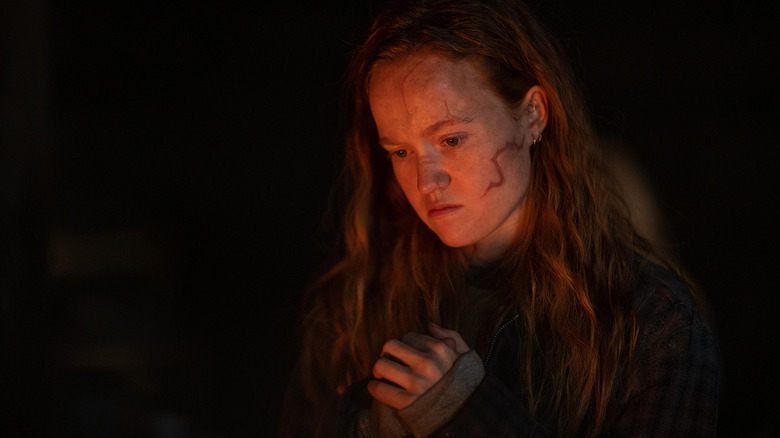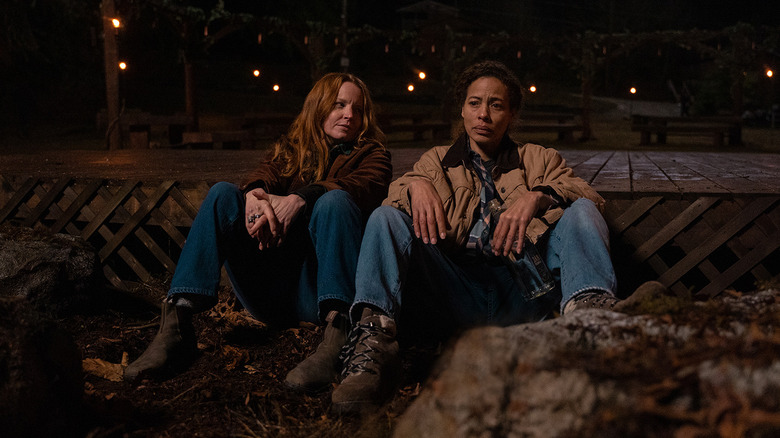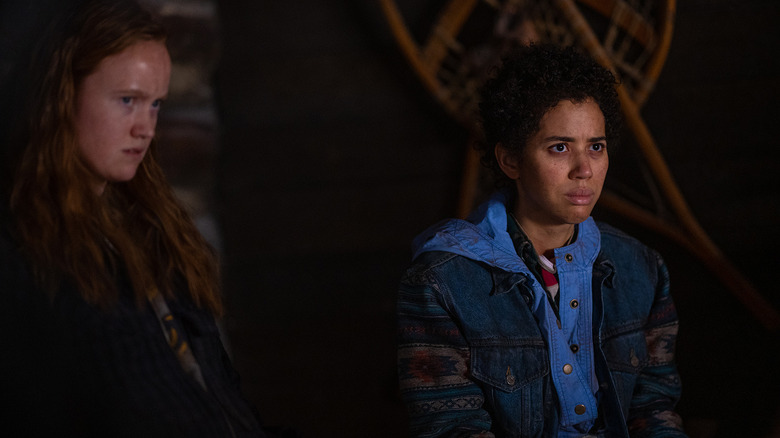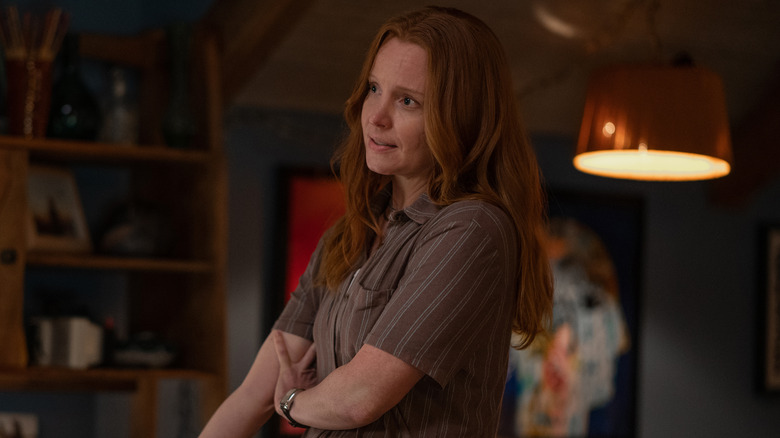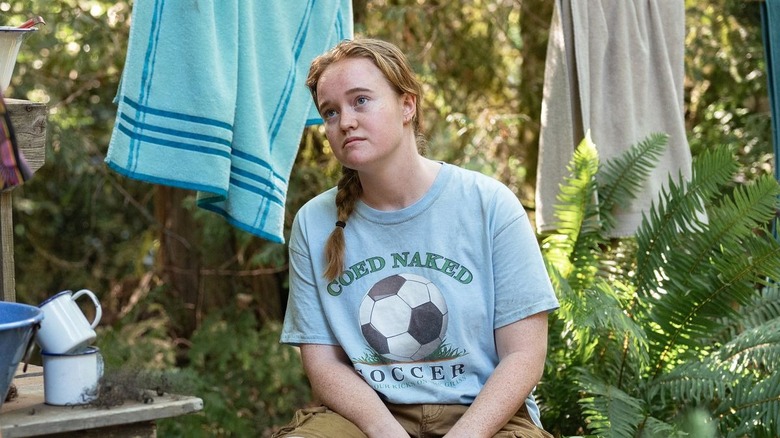Van's Cruel Twist Of Fate In Yellowjackets Season 2 Episode 7
This article contains spoilers for "Yellowjackets" season 2.
"I can't wait for you, Tai. Literally, I don't have that kind of time ... I have cancer."
This is the first thing Van tells Taissa after the duo kisses for the first time in decades. Despite Taissa being married with a family, this is a kiss that "Yellowjackets" fans have been dying to see from the moment it was announced that Lauren Ambrose had been cast as adult Van. Her adulthood served as evidence that the teenage goalie played by Liv Hewson, whom so many fans had fallen in love with, was going to make it out of the woods alive.
However, much like the reveal that Shauna's baby was not a victim of cannibalism because it was stillborn, the discovery that Van is diagnosed with terminal cancer as an adult is almost harder to process than had she been sacrificed to Lottie's tree gods. It's a reflection of the cruel randomness of life. Yet again, "Yellowjackets" serves as a reminder that terrible things happen all the time, plane crashes or not.
I spent a long time trying to figure out how to open up this article. During my recaps, I've spent the last two seasons joking about how I talk about the show — Van specifically — with my therapist, and this episode is absolutely on the docket for this week's session. But how do I begin? Do I paint a cute portrait of exposition and hide the reveal after an ad break or do I beat around the bush to make the announcement more palatable? Ultimately, I decided to rip off the Band-Aid and get it over with at the start, because that's how cancer diagnoses typically happen in real life.
I should know, I've gotten one.
'This isn't one of those times'
Understandably, Taissa doesn't know how to process to news that the first love of her life is dying. "You know when someone says they have cancer but they say, 'but it's the best kind of cancer to have' or 'but they caught it really early?' This isn't one of those times," Van tells her. When Taissa found a bottle of prescription-strength painkillers in Van's medicine cabinet, Van throws them out, claiming they were her mother's before she died of cancer. Later, she takes them out of the garbage. I should have known that Van was lying, not about taking the pills, but about the cancer.
I hid my pills too when I didn't want people to know I was still sick.
Taissa's eyes are filled with tears as she tries to accept this information, but Van is very much content with her reality. "See, I didn't want to have to see this face," she says before commanding Tai "act normal" before they spend time with the rest of the group on Lottie's compound. I imagine the scene is a gut punch to those watching at home.
It certainly was for me, but it was less about Van having cancer and more about watching her be so very comfortable with it. Van has accepted, processed, and some could even say embraced her inevitability. She's had time to sit with it. For Taissa, this is new and painful, but I also don't blame Van for a second for not wanting to waste the little time she has holding someone's hand while they figure out how to deal with what is happening to her.
Again, I should know. I've been there.
'I just think it's time we woke up'
One of the things I've always loved about Van, and something about her that I see in myself, is how unafraid she is to be realistic. In the 1996 timeline, she and Taissa try to recover from the traumatic experience of witnessing their friend deliver a stillbirth. Taissa is full of sniffles and tears, while Van is extremely even-keeled about the whole ordeal. It's not that she doesn't care, she does, but it's obvious that she hadn't been clinging to optimism the way Taissa and some of the others had been.
"I really thought he was gonna make it," Taissa says. Van, who was originally the one putting her faith in Lottie's possible supernatural powers, is done kidding herself. She points out that even if the baby survived, Shauna is still starving. He likely wouldn't have made it very long without any nourishment, or medical attention, and in harsh weather conditions. Taissa is thrown off by Van's arguable pessimism, even saying, "That doesn't sound like you." It may not sound like her, but it is her.
"I kept surviving all this s*** that should've killed me and, you know, I figured that it meant something. You know? Like, maybe it meant that I had some kind of purpose in all of this, but, yeah, I'm not f***ing seeing it, Tai."
Look, I'm no therapist, but I've said almost that exact statement to my wife on multiple occasions. Laura Lee is dead. Jackie is dead. Shauna's baby is dead. And Van, despite having been mauled by a wolf, is somehow still alive. If I had to guess, it sounds like Van has a wicked case of survivor's guilt, something that she's clearly carried with her post-recovery mission and now into her terminal diagnosis.
I have it too, and let me tell you, it sucks.
No return, no reason
I was diagnosed with pancreatic cancer at the age of 23. I was told there was a 12 percent chance I'd make it to 25 and a 5 percent chance that I'd make it to 28. I'll be 33 at the end of the month. If I had any idea how or why I've made it this far, I'd tell you, but the reality is that it just happened. We like to think that cancer plays favorites, only attacking those with genetic predispositions or people who have made bad decisions with how they treat their bodies, but that simply isn't true. We can predict, sure, but ultimately, cancer doesn't follow reason.
I've never been in a plane crash where my friends died and I felt guilty about surviving, but one of my best friends was diagnosed with cancer shortly after I was. I'll spare you the details, but I've spent more time wondering "why her and not me" than is healthy. And despite this so-called "new lease on life," I am still plagued with the depression, anxiety, and mental illness I had before I got sick. If anything, it's only gotten worse, exacerbated by the survivor's guilt I feel every day I'm not out here "living life to the fullest" knowing that one of my best friends is split between multiple urns. The thing no one tells you when you face death and win is that the metaphorical gold medal sits on your chest like a cinder block as a constant reminder of how close you came to dying.
Knowing what I know now about Van, I can see her carrying that weight, too. I can't believe I missed it the first time around ... or maybe I just didn't want to return to that reality for myself.
Never count out the goalie
Van reminds me a lot of my teenage self; a smartass queer girl who can conduct entire conversations in movie quotes and has a sarcastic comment for every situation. So it's difficult for me not to hope that Van's fate aligns with mine and that she somehow defies the odds and cheats death once again.
Van is also the goalie on the Yellowjackets soccer team, which speaks immensely to her character. Her job isn't to chase down the ball or play defense — her job is to stop whatever comes her way and block the opposition from scoring. But, as any athlete will tell you, a goaltender is only as good as their defensive line, and that's where Taissa comes in.
In 1996, Taissa tells Van that she'd be dead without her. Van replies, "I need you too, but I need to know why the f*** I'm still here." I hate to break it to Van, but she's probably never going to know the answer. But what I can say is that the best way to make it through this unfair, often rigged game we call life is to remember that it's a hell of a lot more manageable when we allow the center midfielders in our life to help carry the burden.
Series creators Ashley Lyle and Bart Nickerson admitted during the "Yellowjackets" panel at PaleyFest that Van was originally supposed to meet a tragic death in the wilderness during season 1, but that the writers' room thought it would be more interesting (and funnier) if she was constantly making it out alive. If wolves, blizzards, starvation, and potential ritualistic sacrifice couldn't take her out, I highly doubt a punk-ass b**** like cancer is going to get to do the honor.
But if it does, it does. And I'll talk about that in therapy too.
